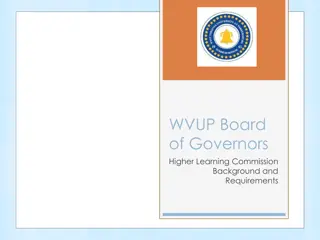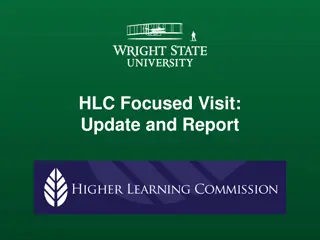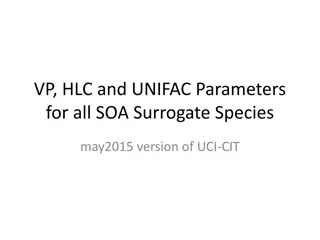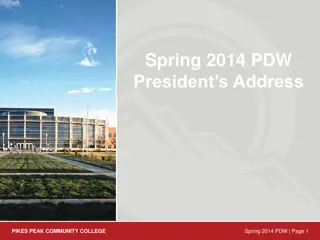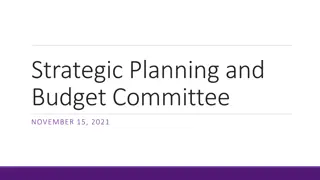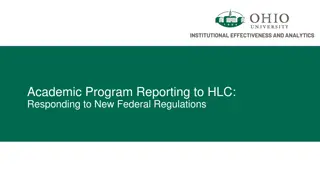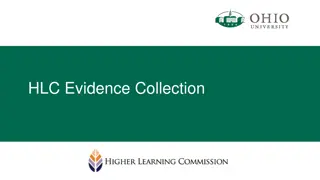
Understanding the Role of the Board in Institutional Integrity
Explore the critical role of the board in maintaining institutional integrity as outlined by the HLC criteria. From defining the mission statement to ensuring financial integrity and autonomy, learn how the board's decisions shape the institution's ethical framework and operational effectiveness.
Download Presentation

Please find below an Image/Link to download the presentation.
The content on the website is provided AS IS for your information and personal use only. It may not be sold, licensed, or shared on other websites without obtaining consent from the author. If you encounter any issues during the download, it is possible that the publisher has removed the file from their server.
You are allowed to download the files provided on this website for personal or commercial use, subject to the condition that they are used lawfully. All files are the property of their respective owners.
The content on the website is provided AS IS for your information and personal use only. It may not be sold, licensed, or shared on other websites without obtaining consent from the author.
E N D
Presentation Transcript
Criteria for which you are directly responsible 1A 2A 2C 5B
Role of the Board HLC Criteria 1.A. The institution s mission is broadly understood within the institution and guides its operations. 1.A.1. The mission statement is developed 1.A.1. The mission statement is developed through a process suited to the nature and culture of through a process suited to the nature and culture of the institution and is adopted by the governing board. the institution and is adopted by the governing board. If someone asked If someone asked you about this, you about this, what would you what would you say? say?
Role of the Board - HLC Criteria 2.A The institution operates with integrity in its financial, 2.A The institution operates with integrity in its financial, academic, personnel, and auxiliary functions; it establishes and academic, personnel, and auxiliary functions; it establishes and follows policies and processes for fair and ethical behavior on follows policies and processes for fair and ethical behavior on the part of its governing board, administration, faculty, and the part of its governing board, administration, faculty, and staff. staff. If someone asked If someone asked you about this, you about this, what would you what would you say? say?
Role of the Board - HLC Criteria 2.C. The governing board of the institution is sufficiently autonomous to make decisions in the best interest of the institution make decisions in the best interest of the institution and to assure its integrity. 1. The governing board s deliberations governing board s deliberations reflect priorities to preserve and enhance the institution. 2. The governing board reviews the reasonable and relevant interests governing board reviews the reasonable and relevant interests of the institution s internal and external constituencies internal and external constituencies during its decision-making deliberations. 3. The governing board preserves its independence from undue influence preserves its independence from undue influence on the part of donors, elected officials, ownership interests or other external parties. 4. The governing board delegates day delegates day- -to to- - day management of the institution to the day management of the institution to the institution s administration institution s administration and expects the institution s faculty to oversee academic expects the institution s faculty to oversee academic matters matters If someone If someone asked you about asked you about these, what these, what would you say? would you say? sufficiently autonomous to
Role of the Board - HLC Criteria 5.B. The institution s governance and administrative structures promote effective leadership and support collaborative processes effective leadership and support collaborative processes that enable the institution to fulfill its mission. structures promote 1. The governing board is knowledgeable about the institution governing board is knowledgeable about the institution; it provides oversight oversight of the institution s financial and academic polic financial and academic policies and practices and meets its legal and fiduciary responsibilities meets its legal and fiduciary responsibilities. 2. The institution has and employs policies and procedures to engage its policies and procedures to engage its internal constituencies internal constituencies including its governing board faculty, staff, and students in the institution s governance governing board, administration, governance. 3. 3. Administration, faculty, staff, and students Administration, faculty, staff, and students are involved in setting academic requirements, policy, and processes academic requirements, policy, and processes through effective structures for contribution and collaborative effort. setting


